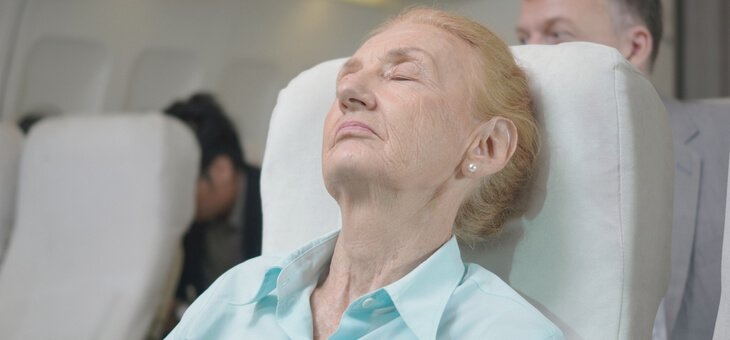Have you ever looked in the mirror after a long flight and received a bit of a shock? Aside from a mixed-up body clock and lack of sleep making you look and feel exhausted, the cocktail of high altitude, cabin pressure and low humidity puts your skin through a lot.
The longer the flight, and more frequently you travel, the higher the damage, so it’s no surprise if you normally arrive at your destination looking more like a shrivelled-up prune than radiant and ready for a holiday photoshoot.
My skin is still SO bad. Must be from the flying. Never been so spotty & dry…
— Lily Pebbles (@lilypebbles) May 15, 2016
Here’s what happens to your skin when you settle down in your seat and the plane takes off, and how to help curb the effects.
1. Your skin dries out
“We sit in cabins with high pressure recirculated air that is very low in humidity, causing extreme skin dryness,” says consultant dermatologist Dr Justine Hextall. “Flying is likely to exacerbate the symptoms of those with dry skin.”
The trick is to keep as hydrated as possible. “Our skin really suffers when it is dehydrated so, preflight, treat it with plenty of soothing moisturiser and make sure you are hydrated,” she adds. “If you’re not too embarrassed, apply a hydrating face mask whilst in flight.”
Read: Experts reveal the worst food you can eat while flying
2. Skin inflammation and breakouts are more likely
On the other hand, if you have oily skin, you might get more breakouts than usual.
“Low humidity on the plane has been known to lead to oily foreheads, chins and noses. The increased oil production is your skin’s way of trying to counteract the dry air,” Dr Hextall says.
She adds: “[When we fly] the oxygen circulation to our skin is reduced and the stress hormone cortisol levels are high. This reduces skin-barrier function, causing skin inflammation, redness and breakouts.”
3. Your cells won’t regenerate as much because you get less sleep
“If you’re travelling to a different time zone, chances are you will miss out on some sleep, in order to adjust to the new time. As you sleep, your body’s cells regenerate, especially at skin level, so missing out on this quality rest can also affect the skin,” Dr Hextall says.
There isn’t a lot you can do about missed sleep, but rather than give up and watch films for nine hours straight, it will help your skin to at least attempt to get some rest.
4. Your skin looks older
Again, this is to do with the filtering of the air on the plane.
“Moisture levels can be decreased and pH levels can be lowered, which is why your skin looks less youthful and has less of a glow when you’re sleep deprived,” she says. “Drinking water is essential on a flight in order to replenish the moisture that is being lost. If you normally use a skin lotion, substitute a richer cream at night or an antioxidant serum.”
Read: Are these viral skincare tips actually effective?
5. UV damage can occur
At 30,000 feet, the plane is much closer to the sun. A study by the University of California, published in the journal JAMA Dermatology, found that if pilots spend just 56 minutes under the large windscreen of the cockpit, it’s the equivalent of 20 minutes on a tanning bed. While pilots probably fly more regularly than you, and sit behind a much bigger window, anyone who flies is at risk of increased UV radiation.
“The UV exposure to our skin increases significantly at 30,000 feet,” says Dr Hextall. “Normal glass blocks all UVB rays, but allows UVA rays to come through – both of these rays are harmful, so this is really important for anyone sitting in direct sunlight that comes through a window. UVA rays penetrate the skin more deeply, playing a big role in sun damage including wrinkles.”
To keep your skin safe, always wear sunscreen on exposed skin onboard and put the window blinds down when you can. You could also make sure you’re seated at the aisle, rather than next to a window.
Currently packing ALL the skincare for my flight to Korea next week – not long to wait now! ✈️ pic.twitter.com/XAClEPyHem
— Elodie (@ElleYeah) September 9, 2017
6. Flying can exacerbate eczema and other skin conditions
“Dry air on aeroplanes does exacerbate eczema,” says consultant dermatologist Adam Freidmann. And if you’re an anxious flyer, that could make things even worse. “Stress and anxiety can also exacerbate pre-existing conditions such as acne, psoriasis and eczema.”
Read: Is professional strength skincare worth splurging on?
7. Drinking alcohol on the plane can make your skin worse
Dr Hextall says: “Alcohol dehydrates your body, including your skin. The first effect of alcohol is actually dehydrating, as it takes the fluid out of your skin. This – in combination with the drying effects of the filtering of air on the plane as well as the air conditioning – can dry out skin even further, causing your skin to itch and flake.”
So stay away from those mini cans of gin and tonic and stick to lots of water. The Aerospace Medical Association suggests eight ounces (one glass) of water for every hour you’re in the air.
– With PA
If you enjoy our content, don’t keep it to yourself. Share our free eNews with your friends and encourage them to sign up.

